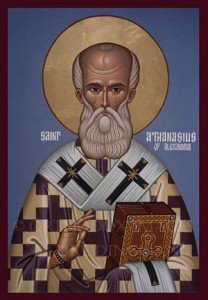In continuing Athanasius’ arguments discrediting Arius’ teachings, he reminds his reader that “my Father is still working, and I also am working (Jn 5:17). And had not the Old Testament wisdom literature averred that “when he [God] marked out the foundations of the earth, then I [God’s Wisdom) was beside him, like a mater worker; and I was daily his delight, rejoicing before him always, rejoicing in his inhabited world and delighting in the human race” (Proverbs 8:29-31).
The logic of worship, then, seems to be plain. If God’s Wisdom and Word creates, as Creator he is worthy of praise and adoration. And if God’s Wisdom and Word is worthy of the Church’s worship, he must be God, though in an ineffable, mysterious fashion.
The Arians felt that Athanasius was moving much too quickly. Did Proverbs 8 really teach what Athanasius was saying? What of Proverbs 8:22? “The LORD created me at the beginning of his work, the first of his acts of long ago.” Surely if the text spoke of God’s Wisdom as created, it must have a beginning, even if that beginning was somehow before time itself. Here, at least from Athanasius’ perspective we approach the heart of the Arians’ error. Had not the apostle Paul described the Son as “before all things” (Col 1:17). Athanasius reasons that if the Son is “before all things,” the creation of Wisdom mentioned in Proverbs must be pointing to a specific purpose in the “economy” of God, that is, God’s plan for human salvation.
Clearly Athanasius believes that if we compare Scripture with Scripture, Paul with the text of Proverbs, we are driven to discover a different interpretation for Proverbs 8:22 than that of the Arians. Athanasius finds his answer in the rhyme and reason of the incarnation and Christ’s redemption of humanity.
Proverbs 8:22 does speak of God’s Wisdom as created. When did this creation take place? At the time of the incarnation, Athanasius contends, when the Word “put on created flesh.” The Wisdom of God was “created for his works,” in the sense that in the incarnation the Son becomes what we are to save us from what we have become. “If he says that he was ‘created for the works’ it is clear that he means to signify not his substance but the dispensation [incarnation] which happened ‘for his works.’
So we see that the early Church, in attempting to truly understand who Jesus IS, looked to the Scriptures and tried to find an answer there. It is clear, as we consider the arguments on both sides, that this debate evolved out of a real desire to understand Who Jesus IS. It is clear that the Arians didn’t truly believe that Jesus was God Himself incarnate. It is equally clear that the followers of Athanasius embraced the fact that Jesus was and is truly God and truly Man. They were dealing, of course, with a GREAT MYSTERY.

